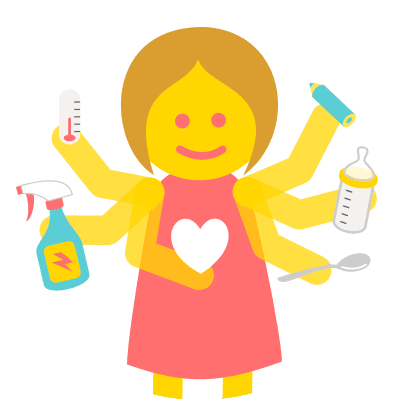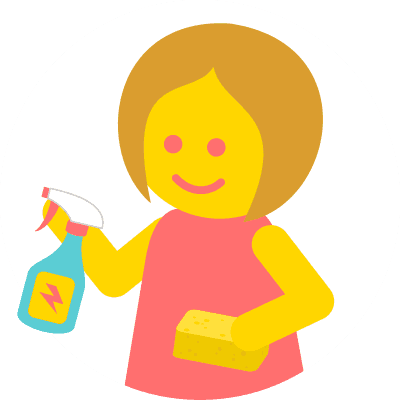Babysitters For Adults (What they're Called & How to Be One)


Written & Illustrated by
Matthew James Taylor
Kidsit Founder, General Manager

Medically Reviewed by
Gina Maria Jansheski, MD, FAAP
Board-Certified Pediatrician, Medical Reviewer
Key Takeaways
- Terminology: While the term "babysitter" is commonly associated with childcare, similar roles exist for adults requiring assistance. These professionals are typically referred to as caregivers, support workers, personal care aides, or home health aides.
- Roles and Responsibilities: Adults in need of assistance may require help with daily activities such as bathing, dressing, meal preparation, medication management, and companionship. Caregivers provide these services to ensure the well-being and comfort of the individual.
- Work Environments: Caregivers may work in various settings, including private homes, assisted living facilities, nursing homes, or through home care agencies. The work environment often depends on the individual's needs and preferences.
- Qualifications: While formal qualifications can enhance employability, many caregivers gain experience through on-the-job training. Certifications in first aid, CPR, and specialized care (e.g., dementia or palliative care) can be beneficial.
- Emotional Support: Beyond physical assistance, caregivers often provide emotional support, helping to alleviate feelings of loneliness and promoting mental well-being.
When you think of babysitting, you usually imagine children. After all, the word "baby" is right in the name! However, there are jobs that are similar to babysitting but involve taking care of adults.
Are there babysitters for adults?
There are many adults who can't take care of themselves due to health issues or limited mental capacity. These adults need supervision and assistance. But instead of being called babysitters, people in these jobs are usually referred to as support workers, adult skilled care workers, social workers, or caregivers.
Kidsit babysitting statistics
What children ages to babysitters prefer?
| Child age | Percent |
|---|---|
| 45.74% | |
| 67.06% | |
| 83.70% | |
| 89.47% | |
| 84.78% | |
| 60.25% | |
| 36.31% |
(Babysitting statistics calculated weekly from our live member data — Updated 16 Feb 2026)
In this article, we'll discuss some jobs that are similar to babysitting but intended to provide support for adults.
Are There Babysitters For Adults?
Yes, there are caregivers who provide a similar role as a babysitter for adults. Although it's not really socially acceptable to call them "adult babysitters," so we have other words to describe them.
Some adults aren't able to care for themselves for a number of different reasons. They might have physical or emotional disabilities, or they could be advancing in age and having difficulty taking care of their routine daily needs, or perhaps they have a medical reason, like a stroke.
Here are some examples of people who perform similar tasks as a babysitter, but for an adult:
Older Adult Care Providers
When a person isn't able to care for themselves or maintain their own home, they may end up living in a specialized care facility, assisted living, or nursing home.
Living in a nursing home or older persons’ care facility is common for people with advanced dementia, Alzheimer's, or other disabling conditions that make it difficult or dangerous for them to live alone. These facilities can also be a good choice for older people who simply don't have the physical capacity to cook for themselves, clean their homes, or perform other routine daily tasks.
These facilities have a number of different staff members who perform tasks that could be considered similar to some things a babysitter does for children.
There are nurses on staff to administer medication and make sure that the residents are safe and healthy. There are personal support workers who help the residents to clean and bathe themselves or go to the bathroom if they have trouble doing it alone.
Staff or volunteers also host a range of activities and events to keep residents engaged and entertained.
Live-In or Daily In-Home Caregivers
Some adults may wish to remain in their homes instead of moving to live in more of a group setting.
If they aren't capable of doing regular daily tasks in their home, they may have a live-in caregiver or someone that comes to the home daily to assist them.
This might be a friend, family member, or loved one. Or it may be someone hired specifically to fulfill this role—similar to hiring a nanny to live with a family and watch their children.
6.45% of babysitters are happy to live-in like an au pair.
Other Types of In-Home Assistance
Some adults are mostly capable of living independently but just need a little bit of help or someone to check in once in a while.
Home care can come in many different forms.
It may be a nurse who comes a few times per week just to check a person's blood pressure and other vital information to make sure they're still healthy and taking their medication.
It could be someone who helps with more physical tasks, like vacuuming, cooking meals, or other things that a disabled or older person may not be mentally or physically capable of doing themselves.
Or it may even just be a volunteer who comes to socialize and spend time with an adult to keep them from getting lonely.
Social Workers
Social workers are generally assigned to adults who live with medical conditions like cerebral palsy, cancer, or terminal illness.
They identify people who need help, usually while they are in the hospital or doctor’s office, and assess their individual situations. Their job is to coordinate services and advocate on their client's behalf to refer them to community resources like food stamps or other programs that might benefit them.
They may also teach their patients and their families certain skills that help them cope better with certain mental, emotional, and behavioral issues.
Errand Services
An adult might not be able to get out of their home for various reasons. So they may need another person to run errands for them.
This can involve buying groceries for them, picking up medications, or any other needs that they can't get out of the house to take care of themselves.
Nowadays, there are apps that make things like meal and grocery delivery easier than ever. But often, there are more cost-effective community options for adults who will need to use them on a regular basis.
23.87% of babysitters are happy run errands and 24.83% can do grocery shopping.
Can You Babysit Without Qualifications? Click the link to find out!
Become An Adult Caregiver – Your Options And How To Do It!
Being an adult caregiver can be a rewarding and fulfilling line of work. But it can also be quite challenging and often takes a special kind of person who is very kind and patient.
There are several ways that you can contribute care for adults in your community that don't require any type of special training or qualifications. Although most jobs working with vulnerable people will require you to be 21 years or older and have at least a high school diploma. You will also likely need to pass a background check.
How old do you need to be to babysit kids? Check out my article Babysitting Age: When Can You Start? (Laws & Maturity Requirements) for the answer!
Volunteer
You don't need to attend university to provide companionship for an older person or an adult that is physically or intellectually disabled.
If you are religious, you can check with your church as many will have outreach programs that match volunteers with people who would like visitors to come and have tea and speak to them for a few hours per week.
There are probably also a few secular organizations in your area that provide a similar service to the community.
Most places, including Australia, Canada, the U.K., and the United States, have a Meals on Wheels program. These organizations provide meals to those who are recovering from illness or have a disability either in the short- or long-term. They also act as a safety and wellbeing check and provide a sense of local community.
You can volunteer with these organizations, either in the kitchen preparing food or helping to deliver food to adults who need it.
Whether you're preparing food for kids or adults, you should read through my article Food Safety for Babysitters (Allergies, Hygiene, & Choking.)
Personal Support Worker
Personal support workers (PSWs) help adults who need assistance with their routine care activities and provide support for any limitations that a person has. Some personal support workers can help administer medication or take measures to prevent infection. But most provide more basic assistance such as dressing, bathing, transportation, and social support.
To become a personal support worker, you must become certified. In most places, this requires completing a one-year course split between two semesters.
Personal support workers can earn anywhere from $15 to $25 per hour, depending on where you live.
Skilled Caregiver
To work in a nursing home, you typically require more training and education than a PSW.
Job titles for skilled caregivers can vary from place to place. They may be called a certified nursing assistant (CNA), a registered practical nurse (RPN), or a few other similar titles.
These skilled caregivers provide medical evaluation and interventions, like taking blood pressure readings or applying compression stockings. As a result, they require more training and evaluations than a PSW. There may also be a minimum number of on-the-job training hours that must be completed to qualify in certain places.
Skilled caregivers typically earn a little more per hour than non-medical caregivers.
Social Worker
Becoming a social worker requires more education than the other options I've discussed above. You will need to complete at least a three-year undergraduate degree. Usually, this is called a bachelor of social work degree (BSW.)
A social worker may start off earning around $55,000 out of school and could earn as much as $80,000 or more later in their career. Although most social workers get into their line of work to help people, not because of the money.
Unique Challenges Of Being An Adult Caregiver
Being an adult caregiver comes with some special challenges.
Helping an adult to complete daily tasks can sometimes be harder than if you're babysitting a child. It may be difficult to bathe an adult or change soiled clothing due to their sheer size and weight. Small children are easy enough for most people to lift and move around. But a 150-pound adult requires a certain level of strength, or special technology, to move around.
Adult caregivers are also at risk of being on the receiving end of more serious violence. If a young kid throws a temper tantrum and starts hitting you, chances are you will easily be able to absorb the blows or restrain them. However, dealing with an adult with a mental disability or illness can pose a bit more risk of injury.
Benefits Of Being An Adult Caregiver
Adult caregivers can have wonderful interactions with their clients. It is rewarding to bring a smile to a person’s face and see them enjoying their time with you.
Some adults that need caregivers appreciate being read to, and they might also find that listening to music makes them feel relaxed. You can do different types of activities with them, play board or card games, or even take walks. Maybe you can even help them write a letter or make a card for their grandchildren.
There are many ways to engage adults in need of care. Just find out their likes and dislikes, and design activities around their abilities to create a special time for them.
Conclusion
If you're currently a babysitter, then transitioning to a career as a caregiver for adults might be a great fit when you're older.
There are lots of different career paths that you can take to accomplish this. You can become a personal support worker, a practical nurse, a skilled caregiver, or take on one of several other roles that provide assistance to adults who need it.
You can also volunteer your time to help adults. You might try helping in your local community by visiting with older individuals or other adults with medical conditions who can't leave their house and read to them or give them someone to talk to. You can join an organization like Meals on Wheels to prepare and deliver food to adults who need it.
Most people that choose to work with adults that need assistance really love what they do. If you have this feeling, don’t hesitate to give it a try.



























